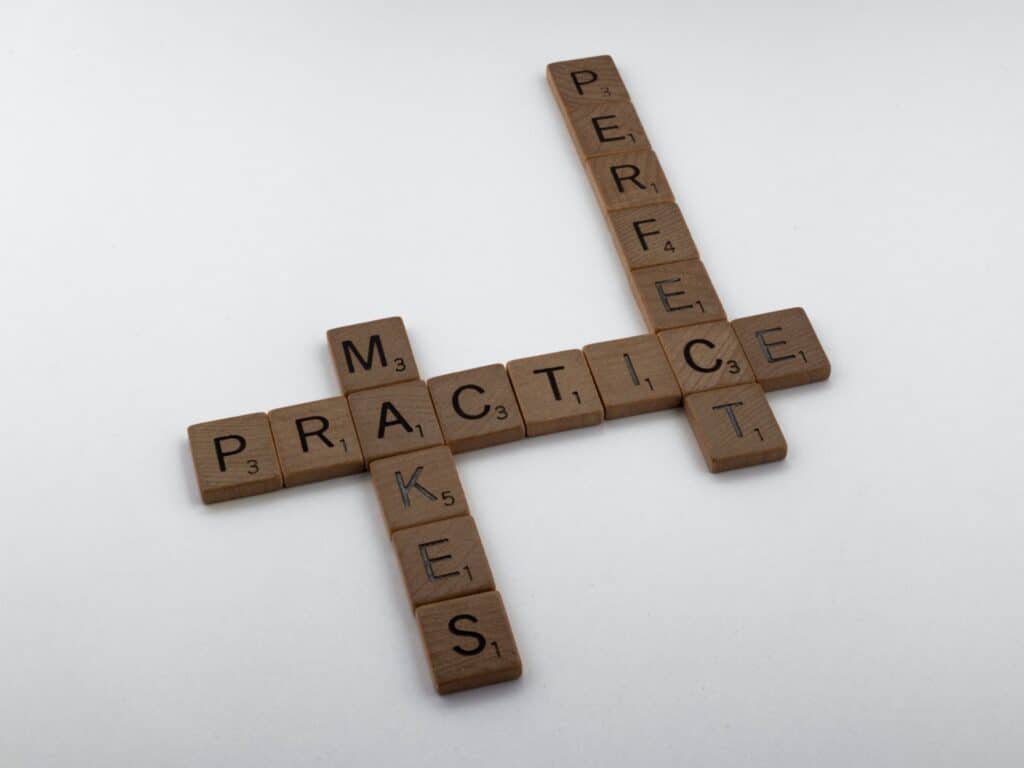Perfection isn’t the shining angelic standard you’re led to believe. Perfectionism is insidious, debilitating, and unapologetically ruthless right down to its very core.
The idea behind perfection is to complete something with zero mistakes or errors, not one. The problem is we’re people, and nobody is perfect. The unrealistic bar perfectionism sets stifles progress, making it impossible to move forwards toward your goals.
That lack of progress leads people to become overly stressed and anxious. But how do I avoid perfectionism? The best place to start making progress instead of aiming for perfection is by understanding the meaning behind the quote “progress not perfection.”
Where Did The Quote “Progress Not Perfection” Come From?
“Progress not perfection” is a quote taken from a number of authors, the most common two beings Billy Philips and Kathy Freston. It’s also used frequently by recovery circles for addicts, Alcoholics Anonymous uses the quote in a key piece of their literature.
The goal and core meaning behind it are to avoid perfection, nobody is perfect, by instead focusing on the smaller daily actions that inch you forward towards your goals. You’ll cover more ground by moving forward than you will by thinking of ways to move forward “just right”.
What “Progress Not Perfection” Means For You
“Progress not perfection” is fine and all, but how exactly does that relate to me? How can I apply this to my daily life?
While everybody has their own unique goals, interest, trials, troubles, preferences, and ways of doing things, a great place to start is by nailing down what exactly you want to make progress towards. Maybe you want to:
- Get a promotion
- Get a better job
- Learn a new skill
- Start going to the gym
- Try a new diet
- Build a side income
- Improve your financial situation
- Improve your mental health
Knowing what you want to achieve makes figuring out the steps you need to take infinitely easier.
Whatever your goal(s) are, there is always a way to make positive progress. Some will be easier to mentally map out than others, but there is a way. In some cases, you may need to change your approach and think outside the box, who knows, maybe your next breakthrough is around a corner you didn’t even know was there.
The real challenge starts immediately after you map out and write down those individual steps that’ll take you to your goal, that’s where perfectionism shows up. Perfectionism is one of the most debilitating feelings, freezing you dead in your tracks.
How Perfectionism Is Holding You Back
Many people struggle with perfectionism in one or several aspects of their lives.
Perfectionism can be defined as – The belief that something you do must have no mistakes or errors. At times involving additional feelings of unworthiness, feeling less likable, or disappointment for being seen as a “failure” when a mistake is made.
Those struggling with perfection commonly struggle with:
- Starting tasks
- Getting something done in a timely manner, compared to others
- Thinking things aren’t done until they’re “perfect”
- Thinking the end product is all that matters
Perfectionism commonly takes three different forms. Excessive personal standards, being overly self-critical and subscribing to social perfection. While all involve perfection, each one is slightly different than the other. I’ll explain how all of this relates to you directly in a moment.
Excessive personal standards – On its surface, having personal standards is no problem, it’s only an issue when they’re so unreasonably high that no one person can reasonably achieve them. As long as those standards aren’t driving you to self-harm or burnout, the motivation you get from them can be constructive. As long as those standards are within reasonable limits, but that doesn’t mean limiting your dreams.
Overly self-critical – This type of perfectionism commonly results in feelings of hopelessness and intimidation. This is also where unreasonable comparisons run rampant. If left unchecked these thoughts and emotions can lead to excess stress, anxiety, avoidance, and self-condemnation.
Social perfection – Perfectionism revolving around social settings, like a party or work, primarily involves a third party’s input. That input could be from a micromanaging boss, peers pressuring you into something you don’t want to do, or people making unjust comparisons between you and someone else.
Now that we’ve broken down what perfectionism is, and the different forms it can take, let’s go over how perfection can impact you. Along with how best to avoid it.
How Do You Practice Progress Over Perfection?
“Progress not perfection” is easier said than done, so let’s break it down into something more manageable. Our goal is to make progress, the amount of progress isn’t the point, any progress at all is a positive step in the right direction. That feeling you get to “overachieve” or “go the extra mile” in the same or shorter amount of time is perfectionism talking.
A major aspect of perfection is warping your sense of a good outcome. That’s done by replacing a realistic goal or achievement with an arbitrary and ambiguous “ideal” that, mind you, is different for everyone.
Progress is naturally trying and inconsistent. At times progress even involves stepping back and truly asking yourself if something even needs to be done. You won’t always be in a position to complete a goal, some may be best left undone while others may need to be saved for a later date. Perfection prevents you from taking that step back to reevaluate not only yourself but your goals.
That evaluation phase is critical not only for making sure you have attainable goals, but also gives you a chance to see where you started so you can truly appreciate yourself and all you’ve been able to achieve.
Some simple strategies you can use to make progress over perfection are:
Learning How To Break Down Goals
Manageable steps and actions help streamline progress toward the goals you wish to achieve. It’s hard to write a book in one sitting, so why start with chapters when you can draft an outline and go one page at a time?
Pause And Reflect
There will be times things don’t go quite as planned, and that’s ok. Take a deep breath, step back, and take a moment to reflect on your goal and the steps you’ve taken toward it. Is this something new to you? Are your steps manageable? Did you think something was important, only to realize halfway through it wasn’t? These things happen, so it’s best to reflect early and often before it’s too late. But don’t use it as a crutch or excuse to avoid something and procrastinate.
New Things Require Forgiveness
Some people excel at math, for some it’s making friends, and for others, it may be technology. Everyone has different strengths, weaknesses, and preferences so don’t beat yourself up if you aren’t in your element or feel like you’re on shaky ground when it comes to something new. Nobody is an expert or perfect at everything, everybody’s been a beginner at something, so be kind to yourself.
Cut The Comparisons
Especially at the beginning, or when something is new, it’s easy to fall into the comparison trap. Avoiding comparisons, especially when they are frequent or unfair before it strangles your desire to proceed forward. Stopping you dead in your tracks, making progress impossible. Remember, everybody is a beginner at something, give yourself time to make mistakes, the best way to learn is by making mistakes after all.
Stop Waiting For Everything To Be Perfect To Be Happy
The final, and most difficult, part of making “progress not perfection” is getting started.
It’s impossible for you to make positive changes in your life if you never give yourself the opportunity to start. Unfortunately, although you may have some extremely supportive friends and family, they can’t do everything for you.
Life requires action. Work, eating, entertainment, and relationships all involve an action or series of actions, just like making progress toward your goals. If things haven’t been going well, or how you’ve expected, what’s the harm in trying out what I’ve listed above for the next few weeks? You have nothing to lose and everything to gain. Give it a shot, and yourself a chance.
If you’d like more helpful tools and techniques to aid you in your “progress not perfection” journey, check out the “Who can it be now?” episode of my podcast.
For those of you looking to dive deeper into self-love through this process, check out Next Level Living, where I help people:
- Stop dismissing themselves
- Start living their life “on purpose”
- Commit to their goals
- Live a life they love








